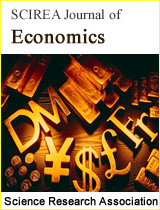Abnormal Supernal Macro Tax Burden Impeding Equilibrium Development of China’s Economy and Inducing Its Economy Receding
DOI: 364 Downloads 17893 Views
Author(s)
Abstract
Recent years have witnessed increasingly heavy pressure for China’s economy to recede which is an anxious phenomenon for global economists and statesmen. The paper has shed new light on that, firstly, it was the abnormal supernal macro tax burden that impeded equilibrium development of China’s economy, which further more made China’s economy to recede; secondly, it is proposed for future frame of Public Finance theory and practice. It is suggested that China’s government should pursue reasonable macro tax burden and the route of China’s modern financial and taxation system is proposed.
Keywords
Macro Tax Burden, Economic Disequilibrium and Receding, Tax Cuts, Frame of Public Finance Theory and Practice
Cite this paper
Hejie ZHANG, Yaojun YANG,
Abnormal Supernal Macro Tax Burden Impeding Equilibrium Development of China’s Economy and Inducing Its Economy Receding
, SCIREA Journal of Economics.
Volume 1, Issue 2, December 2016 | PP. 93-99.
References
| [ 1 ] | Jonathan Skinner, Taxation and Output Growth: Evidence from African Countries, NBER Working Paper No.2335, August 1987. |
| [ 2 ] | Laffer Arthur B., Canto Victor A., and Joines Douglas H., Foundations of Supply-Side Economics: Theory and Evidence (New York, 1983). |
| [ 3 ] | Nir Jaimovich and Sergio Rebelo, Non-linear Effects of Taxation on Growth, NBER Working Paper No.18473, October 2012. |
| [ 4 ] | Peden, E.A., Productivity in the United States and its relationship to government activity: An analysis of 57 years, 1929-1986, Public Choice, 69 (1991), 153-173. |
| [ 5 ] | Gerald W. Scully, Tax Rates, Tax Revenues and Economic Growth, National Center for Policy Analysis (Dallas, 1991). |
| [ 6 ] | Heyan, Mali and Zhoujingyang, Research Overview of Fiscal Income, Tax Policy and macroeconomic Fluctuation, Western commercial Science Review, 2 (2009), 16-28. |
| [ 7 ] | NetEase News(2016), Annual income of 24 trillion, the Chinese government's money come from?, http://data.163.com/16/0308/06/BHK8ICFD00014MTN.html. |
| [ 8 ] | Hejie ZHANG, The Analysis of China’s inner-outer Equilibrium Policy Coordination under Three-gap Model-based on Exchange Rate Regime of a Basket of Currencies (Zhejiang Univ. Press, Hangzhou, China, 2014). |
| [ 9 ] | Yao Shaouxue, Theory and Demonstration of optimal fiscal Income Scale (published D.Phil. dissertation, Tanjin University, 2004). |
| [ 10 ] | Hejie ZHANG and Lu LI, New approaches in analysis of the priority of fiscal income per GDP-a case of China, Cambridge Journal of China Studies, 9 (2015), 67-72. |

